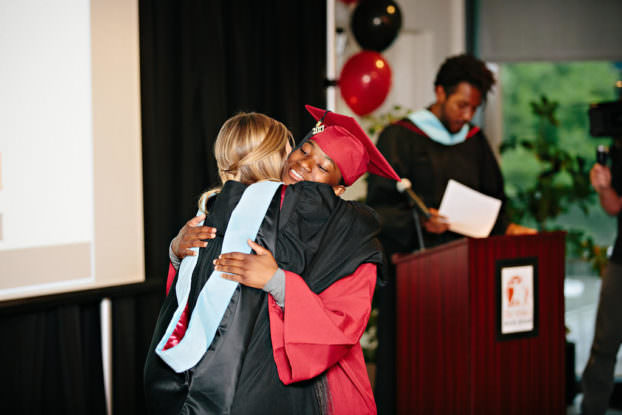School on Wheels Partners With Rise High

When high school student Kia Reid’s brother was arrested, she withdrew emotionally, missing more than a week of school. But in her absence, Reid didn’t fall through the cracks.
Her teachers texted and called to check on her.
“They told me [they were] not here to pressure me, but they wanted me to keep on track with my schoolwork.,” Reid said. “They were really patient, and even came over to my house and brought me my work and went over all [of it] with me.”
Reid graduated in the spring with nine others in the first culminating class from Da Vinci RISE High, a new model of education for disconnected youth in foster care, those experiencing homelessness or students with other needs that schools have traditionally been ill-equipped to meet.
The Los Angeles-area school expanded this fall to a second site at A Place Called Home, a South L.A. community center and social service agency. The expansion was aided by a $10 million grant from the XQ Super School Project, a competition started by Laureen Powell Jobs (the widow of Apple co-founder Steve Jobs) that is designed to re-imagine the design of American high schools.
The growth enabled the school, which currently serves 40 students at its original site, to take on up to 80 additional students this year, as well as expand its service offerings. The new site deliberately holds open slots for mid-year transfers, ensuring access for transient students who are at greater risk of high school dropout.
In California, only 58 percent of foster children graduate from high school by age 18, according to a 2013 report from WestEd. A recent survey of formerly homeless youth reported that two-thirds said homelessness had a significant impact on their education, making it hard to remain and do well in school.
The goal of RISE High is to design a school from the ground up based on a deep understanding of the needs of disconnected youth. Driving this effort is a focus on creating a school accommodating to student needs, where students form deep relationships with staff and each other and are surrounded by support.
For example, to help students whose schedules or living situations make daily attendance impractical, students take classes on a flexible schedule, with work completed in on-site classes as well as in one-on-one tutorials with teachers and even away from school. Projects are designed to be completed out in the community, and students have access to an online learning platform. Tutors come to students wherever they are living, through a partnership with the non-profit School on Wheels.
Read the full article from the Chorinical of Social Change here.
